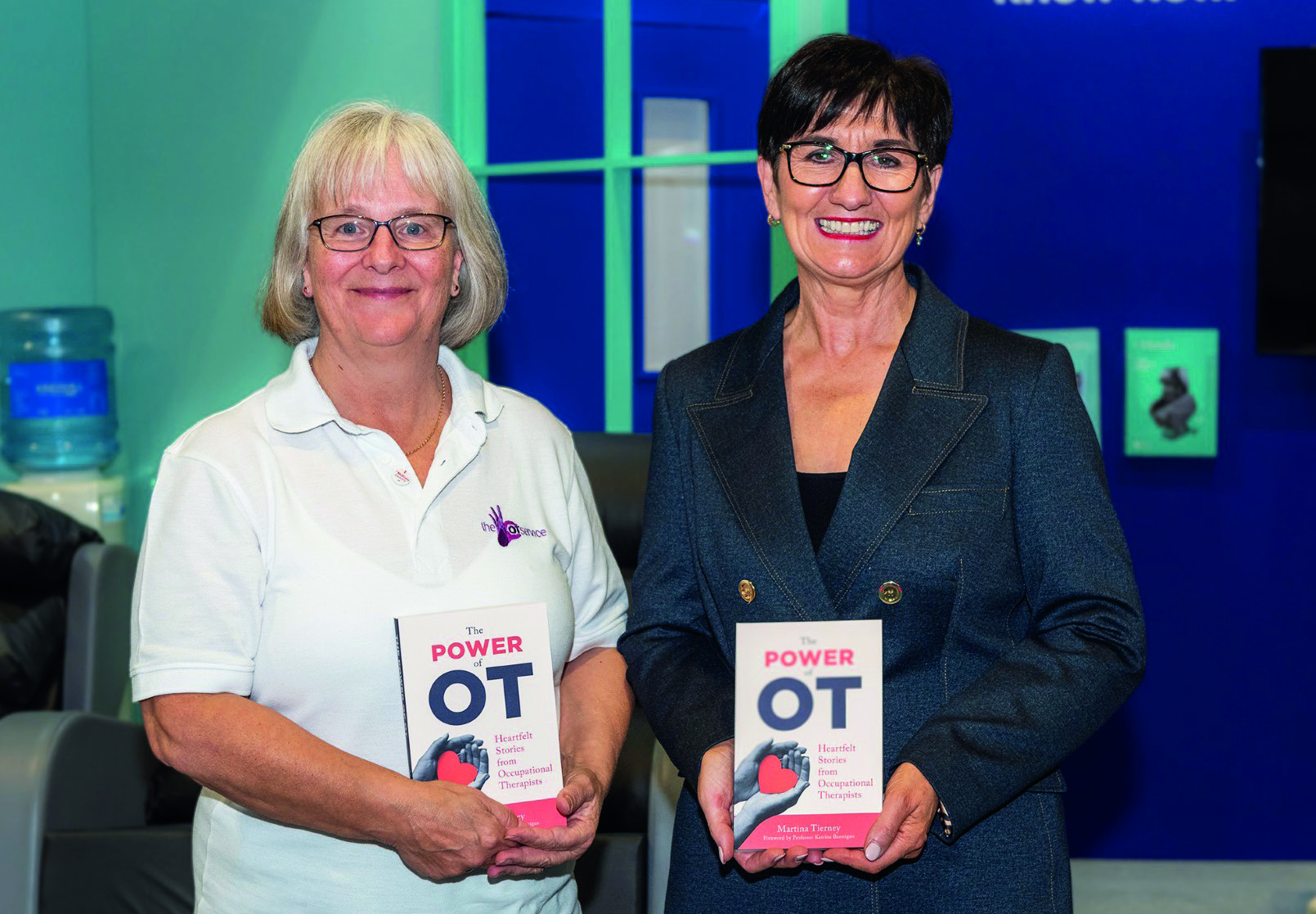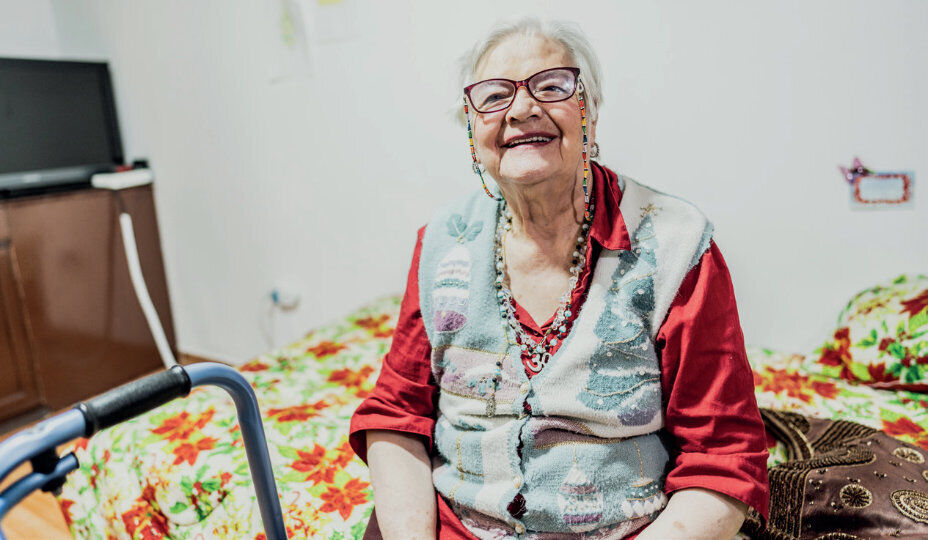Research collaboration aims to reduce the risk of falls
A two-year research collaboration with NRS Healthcare and the University of Salford, which was financially supported by Innovate UK, has found that traditional walking frames ‘do not provide users with sufficient stability when turning and crossing thresholds, potentially increasing the risk of falls’.
As a result, to improve stability, NRS Healthcare has designed a new walking frame that it says ‘is able to stay on the ground during activities where other frames need lifting’.
Susan Bevan, Clinical Excellence Technical Lead at NRS Healthcare, said: ‘Ubiquitous across the NHS and community healthcare settings, Zimmer frames have been in use since the 1950s, with very little change in their design. For many users, typically frail, elderly and those recovering from surgery, these walking frames are a source of anxiety and frustration.
‘We are so pleased that, after rigorous research and clinical testing, we can unveil a safer, more stable option for maintaining user independence.’
The new walking frame was tested in a gait laboratory and in care homes during 2021-2022. In 2023, an initial clinical trial was completed and funding has been agreed for a second clinical trial in users’ homes, while NRS Healthcare has agreed to trial the product with an existing NHS partner.
To find out more visit www.nrshealthcare.com/walksafe.
RCOT’s response to the Scottish Government’s proposed budget
The Scottish Budget sets out the Scottish Government’s proposed spending and tax plans for 2025 to 2026, as presented to the Scottish Parliament.
Shona Robison MSP, Cabinet Secretary for Finance and Local Government said in the foreword: ‘This is a budget by Scotland, for Scotland. A budget for progress. A budget to renew public services and invest in the nation’s priorities. A budget that, most importantly, can bring some hope.’
The budget will centre on the Scottish Government’s priorities to: eradicate child poverty; grow the economy; tackle the climate emergency; and ensure high quality and sustainable public services.
Through this budget the Scottish Government says it will deliver a ‘record investment’ of £21 billion in health and social care; and increase capacity and access to primary care to shift the balance of care to preventative and community-based support and substantially reduce delayed discharges by working with local health and social care partnerships.
Commenting on the Scottish Government’s proposed budget, RCOT Policy and Public Affairs Lead for Scotland, Katie MacGregor, said: ‘It’s encouraging to see this record investment for health and social care, which the sector has been campaigning on for a long time.
‘Occupational therapists are integral to tackling delayed discharge, supporting people in primary care as well as freeing up time for GPs, and supporting people to live safely and independently in their communities.
‘A focus on reducing child poverty and supporting children with additional support needs is also welcomed. A 40% increase in the housing support budget will be vital for occupational therapists to provide equipment and adaptations to people and save a considerable amount of money on long-term care plans.
‘It’s essential that the Scottish Government has the finances to be able to deliver against these commitments made this year and deliver against future challenges. We will continue to advocate for investment in occupational therapy to deliver against the Scottish government’s commitments, and for the people and communities that we serve.’
The Scottish Budget for 2025 to 2026 was published on 4 December 2024. To read more visit www.gov.scot/budget/.
New reforms and independent commission to transform social care
On 3 January 2025, the government announced plans for immediate investment and reforms to improve adult social care and support the workforce.
More people with disabilities will be supported to remain in their homes, thanks to the ‘immediate action’ it is taking ‘to improve adult social care, support the care workforce and take pressure off the NHS’.
Health and Social Care Secretary Wes Streeting is set to confirm an £86 million ‘boost’ to the Disabled Facilities Grant for this financial year, to allow 7,800 more disabled and elderly people to make vital improvements to their home, allowing them to live more independent lives and reducing hospitalisations.
Alongside the funding, the government said its immediate action to support adult social care also includes harnessing the power of care technology to transform care and support older people to live at home for longer, cutting red tape to ensure billions of joint NHS and social care funding is keeping people healthy and taking pressure off the NHS, as well as improved career pathways for care workers and new national standards to ensure providers and families use the best care technology.
The government said it will also develop a shared digital platform to allow up-to-date medical information to be shared between the NHS and care staff, to ensure people receive the best possible care.
The changes announced will support the adult social care sector to give people the best possible care in the most appropriate place, it said. The government will also deliver on its Plan for Change, by reducing the amount of time patients spend in hospital.
Alongside this, the government announced it is ‘kickstarting work’ on the ‘necessary long-term reform to overhaul social care and address the inherited challenges it faces’.
As set out in the manifesto, this deep reform will include the creation of a national care service, underpinned by national standards, delivering consistency of care across the country.
As a first step, the government will launch an independent commission into adult social care, to be chaired by The Baroness Casey of Blackstock DBE CB, to inform the work needed to deliver this.
Separately, the government has said it will shortly publish a new policy framework for the Better Care Fund in 2025 to 2026, to support local systems to deliver integrated health and social care in a way that supports patients and delivers better outcomes.
The new framework will focus £9 billion of NHS and local government funding on meeting two health priorities – moving care from hospital to the community and from sickness to prevention.
Commenting on the announcement about social care reforms and an independent commission, RCOT Policy and Public Affairs Lead for England, Joseph Brunwin, said: ‘Social care reform is long overdue, and we welcome the independent commission and consultation on a new national care service.
‘Careful and long-term planning is essential to ensure lasting and effective social care reform. However, the government should also be looking at the quick wins to make improvements for the people relying on social care now.
‘Occupational therapists are involved with almost half of local authority referrals to social care, and over 3,000 occupational therapists work within the social care system itself.
‘They play a vital role in enabling people to live independently, reducing hospital discharge delays, and easing pressure on both the NHS and social care services.
‘We’re encouraged by steps towards a more sustainable and person-centred social care system, but this must be backed up by urgent investment in the occupational therapy workforce so people can receive the care and support they need while long-term reforms take shape.
‘Investment in the social care workforce is critical, and more investment and more focus on recruitment and retention is vital. We look forward to working collaboratively with policymakers to support the development of a national care service that is both effective and achievable.’
Read more at https://bit.ly/404LXxg. Download the Plan for Change at www.gov.uk/government/publications/plan-for-change.
Investment in the social care workforce is critical, and more investment and more focus on recruitment and retention is vital. We look forward to working collaboratively with policymakers to support the development of a national care service that is both effective and achievable.”
The power of occupational therapy

Above left to right : Kate Sheehan, book contributor, with author Martina Tierney
A new book entitled The power of OT has been authored by Martina Tierney. With 40 years of experience as an occupational therapist, Martina has taken time to reflect on the profession and hopes to inspire others by showcasing the true essence of occupational therapy.
The book comprises of ‘heartfelt stories’ from OTs and, alongside her contributors, Martina aims to highlight the life changing outcomes occupational therapy practice can deliver to clients with mobility and healthcare challenges.
Ultimately, she hopes her publication becomes an integral part of educational reading lists, so that student OTs can appreciate the difference their chosen career pathway can make.
Martina comments: ‘I want to inspire new and established OTs and promote the profession... I have told my story and the story of many OTs from across the world and one of my contributors, I’m delighted to say, is Kate Sheehan.
‘Kate is someone I’ve admired for years as she’s been a well-known trailblazer in the OT world for over 25 years. She’s made such a difference to the profession, and it’s been an honour to have her as part of the book.’
Kate, OT and Director of the Occupational Therapy Service, said: ‘For me, like Martina, I want to influence OTs in the future, but I also want to promote occupational therapy and the uniqueness of it.
‘I want to highlight the difference it can make to the clients and patients we work with and what it means to them. I’ve contributed to this book with a view to hopefully helping the next generation of OTs, but also the wider public.
‘I actually want to underline what we can do and look to make sure people can achieve what they want in life and not just exist when mobility becomes a challenge.’
In summary Kate added: ‘I think sometimes as healthcare professionals we can get stuck in a little bit of a rut and what is really important about the stories in this book, is they show the depth and breadth of what occupational therapy can achieve.
‘For every OT starting out, I want them to realise the career they have chosen will always be an inspiring one, with no boundaries in terms of patient outcome and career reward.’
Activism and social change within occupational therapy
An RCOT EDB insights session – Activism and social change within occupational therapy, ensuring our practice is LGBT+ inclusive – will take place on Tuesday 11 February 2024, 6.30-7.30pm.
This insight session will explore how we can examine, improve and adapt our OT practice, to ensure that it is inclusive and supportive of people of all sexual orientations and gender identities – all members of the LGBT+ community.
Speaker Niall Kirrane works as a Clinical Specialist OT in Ireland’s National Gender Service, where he has established a new OT role, the first of its kind in the country.
He will draw upon his clinical experience working with the transgender community, to highlight what changes we can make on both an individual and service level to achieve change and be effective activists within our own profession.
Niall has worked across a variety of mental health and psychosocial settings throughout his career, and is particularly interested in the impact of sociocultural factors on wellbeing and occupational engagement.
He was a co-author of the LGBT+ awareness and good practice guidelines for occupational therapists, published by the Association of Occupational Therapists of Ireland (AOTI) in 2019.
Since publication, these guidelines have been used by OTs both nationally and internationally, and they have been translated into a number of languages for use in other countries.
Niall is the current chairperson of the AOTI’s Gender and Sexuality in Occupational Therapy Advisory Group.
Book your place now at https://www.rcot.co.uk/events/lgbtq-history
Occupational therapy expert named in Newsweek’s Top 100 Romanians Abroad
 Brunel University of London’s Dr Liana Nagy was among the Top 100 Romanians Abroad presented with their awards at a ceremony at the Palace of Parliament in Bucharest in October 2024.
Brunel University of London’s Dr Liana Nagy was among the Top 100 Romanians Abroad presented with their awards at a ceremony at the Palace of Parliament in Bucharest in October 2024.
Dr Nagy, who grew up in Blaj, qualified as an OT in the UK in 2010 and joined Brunel as a lecturer in the subject last year. Her award, in the Top 100’s health category, was in recognition of various projects that have led to an enrichment of the occupational therapy profession and of therapy centres in Romania.
One of these projects is the redistribution of disability equipment that would otherwise go to waste. ‘There are large amounts of unused disability equipment in the UK which are discarded, rather than reissued to patients, which isn’t great from a sustainability perspective,’ Dr Nagy explained.
‘But there are some charities that refurbish this equipment and check it for safety so that it can be made available for people with limited access in low- and middle-income countries.
‘Since 2016, I have supported Romanian organisations who need equipment by forging a strong, honest and transparent partnership with one of the charities in the UK, PhysioNet. This global collaboration has reduced the inequity gap while also reducing waste: a win–win for both countries.’
Dr Nagy was also recognised for shaping the therapy process for children with chronic conditions in Asociația Maria Beatrice, a national centre, and for being part of a UK-based occupational therapist team who trained staff in Romania on several occasions.
Commenting on her award, Dr Nagy said: ‘I’m honoured to have received a Top 100 Romanian Abroad award and that I was able to raise awareness of the ongoing needs of the children with chronic conditions and disabilities, and the occupational therapy input.
‘I was inspired to meet many other Romanians from the diaspora who have made notable contributions to health or other sectors, and to hear about organisations in Romania, including universities, who are keen to develop partnerships with the UK in ways that can benefit both parties.’
Delivering proactive care for older people with frailty
© Frazao Studio Latino via Getty Images
The British Geriatrics Society (BGS) has released a report that outlines how to deliver proactive care against core components and key enablers, acting as a roadmap for implementing the NHS England framework and delivering proactive care services.
Be proactive: Delivering proactive care has eight recommendations. The first is that proactive care services should be aligned to the approximate geography of a Primary Care Network (PCN)/Primary Care Cluster (PCC) or equivalent, with a dedicated proactive care team in each equivalent area across the UK.
The second recommendation is that policy makers and commissioners should prioritise national funding and contractual arrangements to ensure that proactive care is available to all older people living with frailty in the community.
It also recommends that leadership is vital to the delivery of successful proactive care services, and it should be supported and nurtured through training opportunities and protected funding.
Furthermore, the report says that outcome measures are vital in evaluating the success of proactive care interventions and should always be implemented when new services are launched.
It calls for national guidance on how to measure the impact of proactive care interventions to be published, and says investment is needed in clinical research and IT infrastructure, focused on data collection and evaluation.
The fifth recommendation is that proactive care services should be staffed by a core multidisciplinary team, consisting of at least one GP with an interest in frailty, one advanced clinical practitioner, and one care co-ordinator.
BGS says that‘a gold standard team would include professionals from social care, mental health services, therapies, pharmacy and geriatric medicine’.
The final three recommendations are for local and national investment in training and development opportunities for the multidisciplinary team working in proactive care, including mandatory frailty training, training in communication, leadership, and coaching, and education on the wider health and care system.
A culture of flexible and cross organisational working should be embedded in proactive care services. And that services across the UK should use its Be proactive: Evidence supporting proactive care for older people with frailty to make the case for proactive care services in their local area and as a roadmap for implementing services.
Dr Jennifer Sutton, RCOT Project Lead (CAHPR), who was a member of the advisory board that informed the content of the report, commented:
‘This report really illustrates the importance of multi-disciplinary team working in proactive frailty care. It includes six different real world case studies of proactive frailty services, which have been set up and led by occupational therapists and/or include occupational therapists as key members of the multidisciplinary team.
‘The document is aimed at healthcare professionals, clinical leaders, policy makers, and commissioners and acts as a roadmap for delivering proactive care for older people with frailty.
The document is aimed at healthcare professionals, clinical leaders, policy makers, and commissioners and acts as a roadmap for delivering proactive care for older people with frailty.”
‘A huge credit and thank you to RCOT Professional Adviser Genevieve Smyth, who I was able to work with on this, and to our amazing RCOT members. The case studies were gathered through engaging with our RCOT primary care network.
‘It’s fantastic that their innovative work is being cited as examples of good practice in this document; it further cements the role of occupational therapy in this important area of practice.'
Download the report at https://bit.ly/3PpTFgm.

